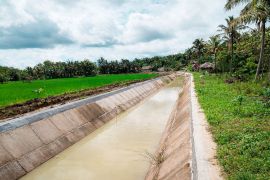The group, comprised of the environmental group World Wildlife Fund (WWF) Indonesia, the Krueng Peusangan riverbank forum (FDKP), the Ureung Inoeng Aceh Syura Agency (BSUIA), and the Lhokseumawe Natural Resources Conservation Agency (BKSDA), shared some important knowledge on the wild elephant`s characters.
The talk also discussed several strategies to handle wild elephants and drive the animals off to the forests.
Syam Suardi, the education and awareness specialist of WWF Indonesia, noted on Thursday that villagers who lived nearby the wild elephant habitats, such as forests, need to understand some critical points while driving off the animals from the plantations or residential areas.
The villagers should avoid coming in contact with the wild male elephants that are in their mating seasons, commonly known as Must period, Suardi explained.
The period is noted by several characteristics, such as the secretions from the elephants` eyes and ears.
During the mating season, the elephant would be more aggressive, because the testosterone level in the animal would rise to 60 times higher than the normal condition.
"The (aggressive) behavior would last for three to five months for one to four weeks. We hope the villagers would avoid any contact with the animals," he noted.
Suardi stressed that the villagers also need to stop hurting the animals, because the injured elephants would be more aggressive to the people.
When the elephants have a panic attack, they would arbitrarily run, which would be harmful to the villagers. Hence, people should remain calm and stay alert, he remarked.
During the workshop, the group not only disseminated information but also hosted a simulation on how to drive off the wild animals.
For years, villagers at Cok Gireng have lived alongside the wild elephants. As the number of settlement and population increased, conflict between human and elephants has been regularly occurring.
Reported by Mukhlis
(UU.KR-GNT/A/KR-BSR/A014)
Reporter: antara
Editor: Heru Purwanto
Copyright © ANTARA 2017












